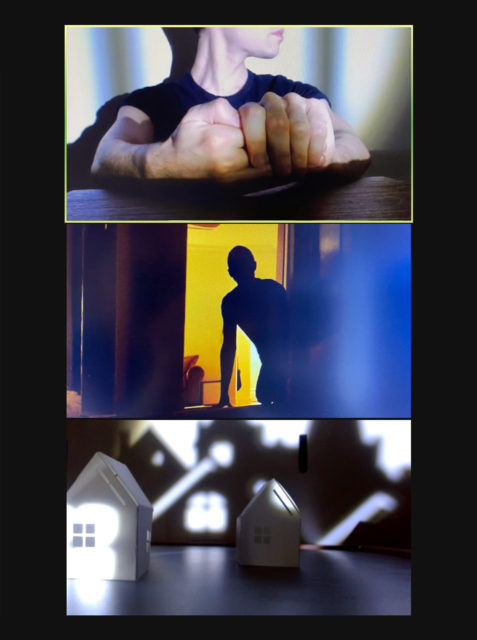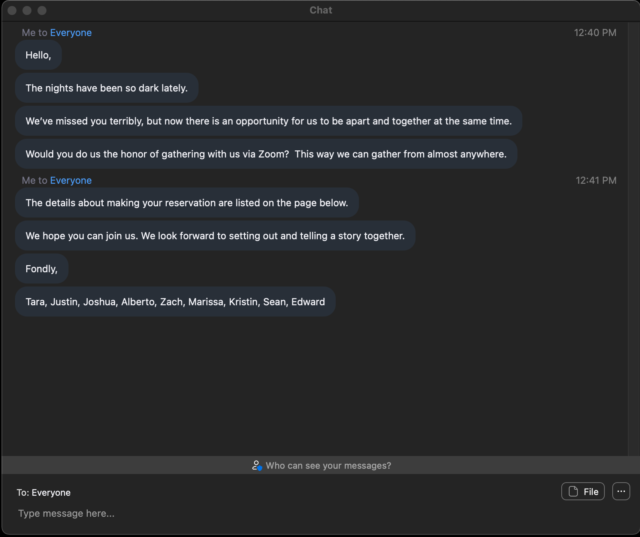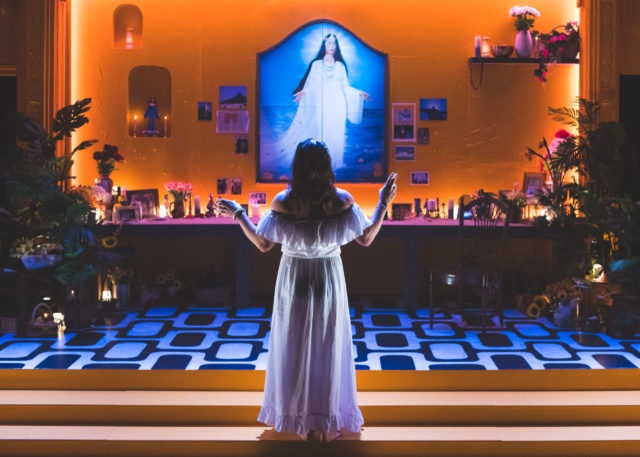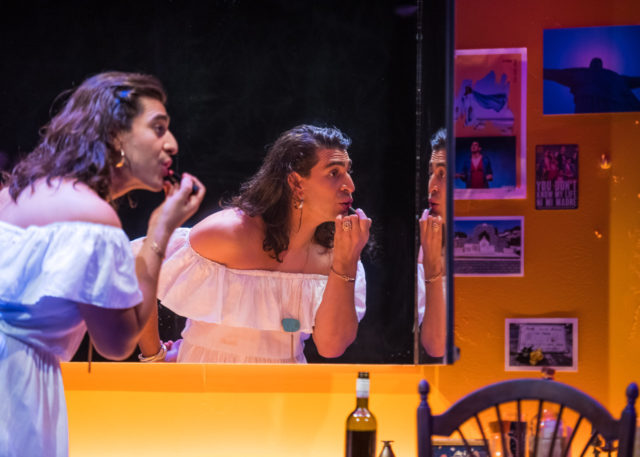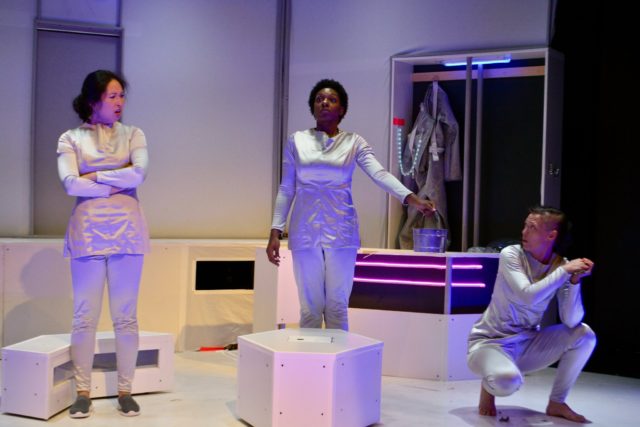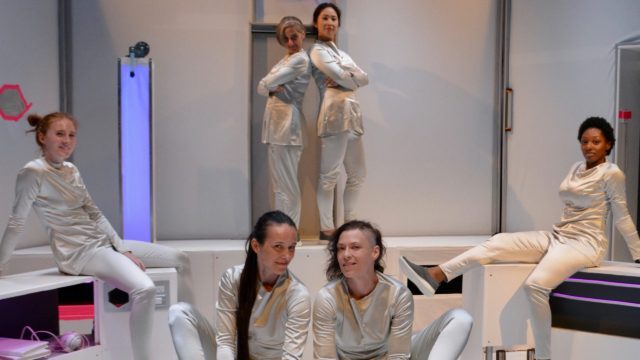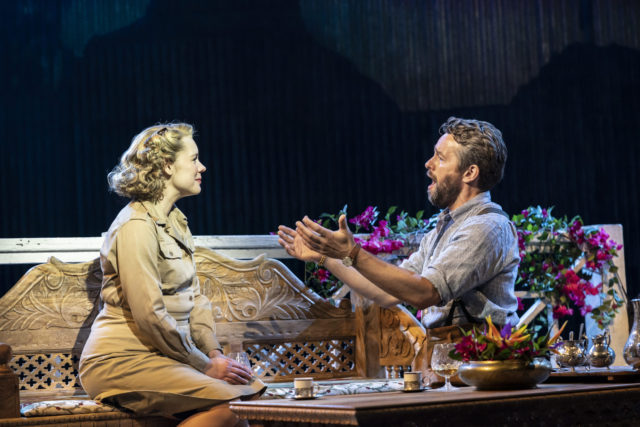
Adam Files, Nicholas Miles Newton, Meagan Moses, and Ed Altman (clockwise from top left) get into a tense Zoom meeting in Adjust the Procedure
ADJUST THE PROCEDURE
Philadelphia Fringe Festival
Available on demand through October 4, $10
fringearts.com
spincyclenyc.com
Note: The following review was written in March 2021, when Adjust the Procedure debuted online. It is now back for an encore presentation during the Philadelphia Fringe Festival.
A new genre of theater has arisen during the pandemic lockdown: Zoom plays about Zoom gatherings, both personal and professional. I’m not talking about Zoom benefits with actors reading Shakespeare and Sophocles or Fast Times at Ridgemont High and The Princess Bride but new works written for Zoom, performed on Zoom — and set on Zoom. For the Public, Richard Nelson’s What Do We Need to Talk About? reunited the familiar Apple family with the original cast — Jon DeVries (Benjamin Apple), Stephen Kunken (Tim Andrews), Sally Murphy (Jane Apple Halls), Maryann Plunkett (Barbara Apple), Laila Robins (Marian Apple Platt), and Jay O. Sanders (Richard Apple) — holding a Zoom family meeting. Rough & Ready Productions’ seven-minute Brown, an early entry from April 2020, imagines a Zoom brainstorming session about the color of cruise line swimwear, particularly prescient given the status of cruises over the last year. And Jordan E. Cooper’s Mama’s Got a Cough (with the wonderful Danielle Brooks) is fourteen of the funniest minutes you’ll ever spend on Zoom, as a family convenes an emergency online meeting to figure out what to do about their elderly matriarch.
Spin Cycle and JCS Theater Company take it to the next level with Adjust the Procedure, which delves deep into the psychological impact the coronavirus crisis is having on individuals as well as institutions, in this case a university. Written and directed by Jake Shore, the play is built around several Zoom meetings dealing with the school’s Counseling and Wellness center and what might have gone wrong in the case of student David De La Cruz. Director of academic development Kyle (Adam Files) first discusses the issue with assistant dean of student achievement Ben (Nicholas Miles Newton), relating a call he received from the suicidal undergraduate.
“In most circumstances I wouldn’t have pressed him on it at all, I would’ve just followed the procedure, but I felt I had a responsibility to deal with it on my own for some reason,” a concerned Kyle says.
Ben initially seems more interested in following the rules than facing the reality of the situation. He replies, “I would advise against intervening. . . .” That conversation ends with Ben’s advice:
“You need to know your role, Kyle, and it’s going to help a great deal in the long run. The life of this student is not on your back. It does not hang in the balance due to anything that you’ve done or will do. That’s just not the way it is. You talking to him, interfering, it’s just not going to matter that much in the grand scheme of things. It’s brutal, I’m sorry to say it, but it’s the truth. You don’t have that type of responsibility to him, or to any other student. It’s just not your job.”
On another call they are joined by director of enrollment management Aimee (Meagan Moses), who appears to only care about the numbers on her spreadsheet rather than the students themselves. She explains with robotic precision, “As you both know, for the most part, we weathered the storm caused by the international student problem, and in addition to that, we’ve made up for the additional students who either dropped out, transferred, or exited for reasons directly tied to the pandemic.” Those reasons include deportation.

Despite Ben’s pleas for Kyle to stop, the latter continues to press the issue as they discover more about Counseling and Wellness and where the De La Cruz case failed. Soon Kyle, Ben, and Aimee are on a Zoom call with executive dean Frank (Ed Altman), who is all about protecting the university’s reputation and avoiding any kind of legal trouble, no matter the truth. The four of them get into it, ascertaining things about themselves and their colleagues they might not like, leading to a surprise ending.
Available on demand through October 4 as part of the Philadelphia Fringe Festival, Adjust the Procedure gets off to a slow start, just talking heads Zooming in from wherever they are sheltering in place, but Shore (The Devil Is on the Loose with an Axe in Marshalltown, Down the Mountain and Across the Stream) picks up the pace as he brings up pertinent issues that address how the pandemic has been handled from multiple perspectives. Kyle represents the person who wants to do right but is thwarted by rules and procedures that need to be reevaluated. Ben is the earnest employee who might agree with Kyle but is not about to rock the boat. Aimee is the efficiency expert who can’t see the human component. And Frank claims that he is “worried about society unraveling,” but his beliefs about just what that society is don’t necessarily gel with the others’.
No one comes out unscathed in this trenchant Covid-19 parable; it might be specifically about a university, since education has been so hard hit during the pandemic, but it could also be about corporations and local, state, and federal governments as they face the reality of mounting death tolls and economic collapse and decide how they are going to proceed, choosing whose interests to put first amid the bureaucracy and numbers crunching.
At one point the four characters are discussing a new class at the school, “Free Will: The Big Lie.” Frank pounces on the subject, declaring, “Do you know what an immature adolescent is going to think when he finds out that free will doesn’t exist? He’ll misconstrue it. All of a sudden, there’s no accountability for one’s actions. If there’s no free will, then there’s no control.”
As has been made all too clear during this crisis, control is all about power — control of information, of the media, of statistics, of money, of scientific interpretation — primarily at the expense of the individual, the poor schnooks trying to do right by themselves, their family, their school district, and their community, attempting to assert whatever free will is supposed to exist in a representative democracy. And as we have learned, procedures need to be adjusted, and fast.
